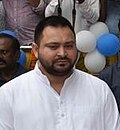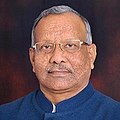| Deputy Chief Ministers of Bihar | |
|---|---|
 | |
| Government of Bihar | |
| Style | The Honourable (Formal) Mr. Deputy Chief Minister (Informal) |
| Type | Deputy Head of Government |
| Status | Deputy Leader of the Executive |
| Abbreviation | DCM |
| Member of | |
| Reports to | |
| Residence | 208, Kautilya Nagar, MP MLA Colony, Patna |
| Seat | Patna Secretariat |
| Nominator | Members of the Government of Bihar in Bihar Legislative Assembly |
| Appointer | Governor of Bihar on the advice of the Chief Minister of Bihar |
| Term length | At the confidence of the assembly Deputy Chief minister's term is for 5 years and is subject to no term limits. |
| Inaugural holder | Anugrah Narayan Sinha |
| Formation | 2 April 1946 |
| Website | official website |
The deputy chief minister of Bihar is the second highest ranking member of the state's council of ministers. The current deputy chief ministers of Bihar are Samrat Choudhary and Vijay Kumar Sinha serving in office since 28 January 2024.








